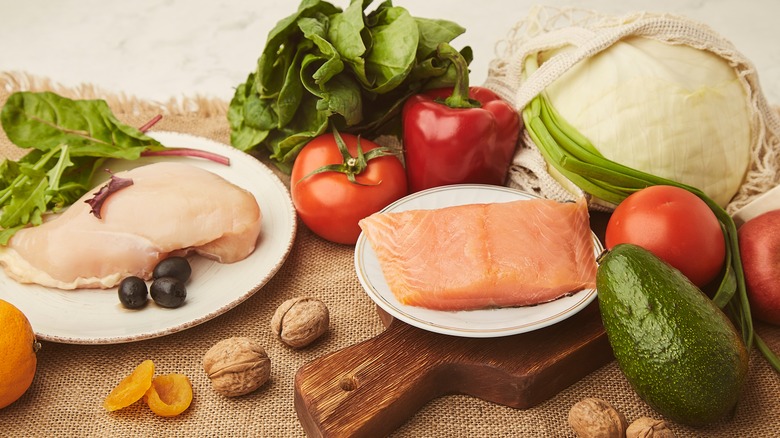Avoid Eating Onions If You Have This Medical Condition
Some people simply aren't a fan of onions. Maybe it's the vegetable's texture, taste, or overwhelmingly powerful scent that has them avoiding onions like the plague. Oppositely, some people avoid onions not by choice, but out of necessity. Such may be the case for people diagnosed with Crohn's disease, a type of inflammatory bowel disease (IBD).
People with Crohn's disease experience inflammation in the digestive tract, most often within the small intestine, according to the Mayo Clinic. This can cause symptoms such as abdominal pain, fatigue, fever, diarrhea, weight loss, and more. In more severe cases, a person may develop kidney stones, anemia, or inflammation throughout other areas of the body including the liver, eyes, or skin. The U.S. Centers for Disease Control and Prevention (CDC) reports that approximately 3 million people in the U.S. were living with either Crohn's disease or ulcerative colitis in 2015. Although the cause of Crohn's disease isn't clear, certain foods can exacerbate symptoms during a flare-up, including onions (per Milton Keynes University Hospital).
Onions may worsen symptoms of Crohn's disease
The reason onions can make matters worse for IBD patients is that they're considered a high-FODMAP (fermentable oligosaccharides, disaccharides, monosaccharides, and polyols) food. FODMAPs are sugars that can prompt unpleasant gastrointestinal symptoms like bloating, gas, or stomach pain, registered dietitian Anne-Marie Stelluti explains (via Crohn's & Colitis Australia).
Additionally, if you're experiencing diarrhea as a symptom during a Crohn's disease flare-up, you'll want to dial back your fiber intake, which means steering clear of raw veggies like onions. According to the U.S. Department of Agriculture (USDA), 1 cup of chopped raw onions contains 2.72 grams of fiber. While this isn't an exorbitant amount, it's recommended to hold off on eating too much fiber until after gastrointestinal symptoms have resolved.
Unfortunately, unions can be tricky to avoid as they're often hiding in our favorite stews, cream sauces, dips, and more. For these reasons, people with IBD may benefit from sticking with a low-FODMAP diet.
A low-FODMAP diet may help with Crohn's disease
A low-FODMAP diet involves the temporary reduction of FODMAP foods in one's diet such as onions, garlic, wheat, and lentils, as well as lactose- and fructose-rich foods (per Crohn's & Colitis Foundation). The bacteria in our gut are able to quickly break down FODMAP foods for the conversion of energy. But scaling back on these foods during a Crohn's disease flare-up may help people with the condition side-step the distention of the small bowel, increased gas production, and abdominal discomfort that often accompanies this metabolic process, according to a 2020 scientific review published in Nutrients.
In comparing the low-FODMAP diet to other kinds of diets, the researchers found that the low-FODMAP diet resulted in an improvement in gastrointestinal symptoms, fewer bouts of diarrhea, lowered inflammation, and increased quality of life in patients. However, more research is needed into the dietary recommendations for people with Crohn's disease, as the Mediterranean diet, semi-vegetarian diet, or the CD-TREAT diet, among others, can also be beneficial to IBD patients. Furthermore, not all Crohn's disease patients will be affected by the same foods. Some people may be able to tolerate onions with no problem, for instance. Because patients with Crohn's disease will have different dietary needs, it's always best to consult with a physician.



